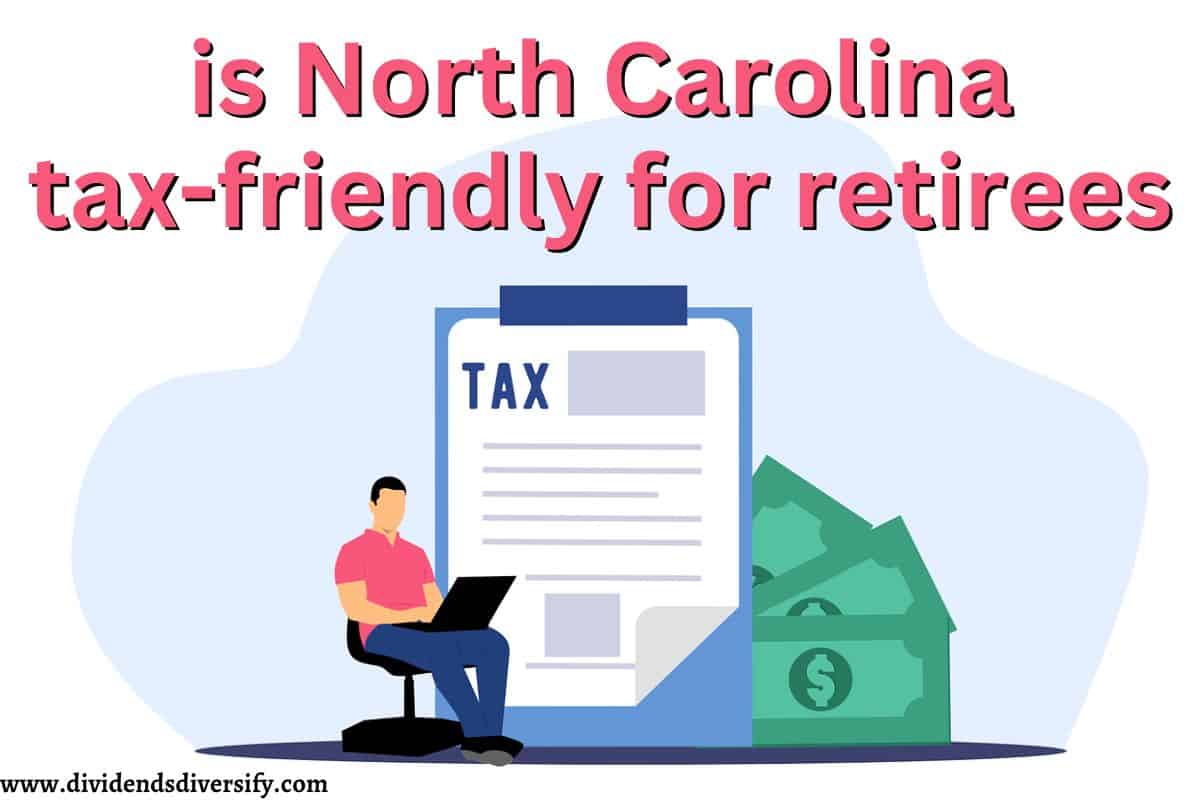Exploring The Pros And Cons Of North Carolina Retirement Taxes
Are you thinking about moving to North Carolina for retirement? If yes, I will help you understand the financial impact of North Carolina retirement taxes.
Let’s hit today’s question head-on. Then you will better understand if North Carolina is retirement tax tax-friendly.
Is North Carolina Tax-Friendly For Retirees?
North Carolina offers several tax breaks for retirees. For example, Social Security benefits are tax-free, qualifying seniors get a break on their property taxes, certain military retirement benefits are tax-free, and there are no estate taxes. Conversely, most retirement income aside from Social Security and military pay is subject to income tax at the state’s flat tax rate, reduced by a standard deduction.
Next, I will dig deeper into the answer to today’s question by examining the cons and pros of North Carolina taxes for retirees.

Disclosure: At no cost to you, I may get commissions for purchases made through links in this post.
Tax Breaks For Retirees In North Carolina (The Pros)
North Carolina retirement taxes are friendly to retirees in the following areas:
- Social Security benefits
- Military retirement pay
- Estate and inheritance taxes
- Homestead property tax exemption
I will address the detail of each of these points one at a time.
Does North Carolina Tax Social Security Income?
North Carolina does not tax social security benefits received. Thus, your income from social security is free of state income tax after moving to North Carolina.
Most retirees’ social security benefits are included in income and taxed at the federal level. As a result, North Carolina allows tax filers to have a deduction on their state tax return. Removing your social security earnings will increase your refund or decrease your state income tax liability.
Does North Carolina Tax Military Retirement Pay?
Military service retirement pay in North Carolina is tax-free for those who qualify. You must have served 20 or more years in the U.S. Armed Forces or are medically retired to qualify for this tax break.
Does North Carolina Have An Estate Tax?
North Carolina does not have an estate tax or inheritance tax. The state repealed its legacy “death tax” in 2013.
As a result, after moving to North Carolina, you may leave as much money as you desire to your heirs. The state won’t tax a penny of it.
On the other hand, your estate may still be subject to federal tax if the value is high enough. However, very few estates (less than 1%) are large enough to qualify.
Does North Carolina Offer Property Tax Breaks To Retirees?
North Carolina offers property tax relief to qualifying seniors. The tax break is called the Homestead Property Exclusion/Exemption.
To qualify, residents must be 65 or older, have an annual income of less than $33,800 (in 2022), and submit an application to the county where they reside.
For those who qualify, the tax law excludes a portion of your home’s appraised value from property taxes. The exclusion is $25,000, or 50% of the appraised value of the residence, whichever is larger.
Income includes earnings from every source, including social security benefits, retirement payments, interest, and dividends.
I will have more on North Carolina property taxes in a moment. But for now, let’s move on to the areas where North Carolina could be more tax-friendly for retirees.
Less Friendly Retirement Tax Laws In North Carolina (The Cons)
Other forms of retirement income are taxable in North Carolina at the standard tax rates enacted into state law, including:
- Public and private pensions
- Individual Retirement Account (IRA) withdrawals
- 401(k) plan distributions
- Wages from full or part-time work
- Realized capital gains from investments
- Interest and dividends
What Is The North Carolina Tax On Retirement Income?
The tax rates and standard deductions highlighted below apply to all taxpayers in North Carolina. Hence, they apply to the retirement income sources I listed in the previous section.
Thus, there are no specific tax breaks for retirees in these areas.
Historically, the state has a high individual income tax rate. One of the reasons not to move to North Carolina in the first place.
Fortunately, the rate is declining, as shown in the table below.
Table 1: Tax Rate On North Carolina Retirement Income
| Tax Year | Income Tax Rate |
| 2015-16 | 5.75% |
| 2017-18 | 5.5% |
| 2019-21 | 5.25% |
| 2023 | 4.75% |
| 2024 | 4.6% |
| 2025 | 4.5% |
| 2026 | 4.25% |
| 2027 & beyond | 3.99% |
Standard Deduction For North Carolina Retirees
One benefit for North Carolina taxpayers is the relatively large standard deduction.
The deduction is $12,750 for single filers, $25,500 for married filing jointly, and $19,125 for heads of household in 2023. All types of income, including retirement income below these thresholds, are tax-free.
Next, I will cover other taxes retirees living in North Carolina should know.
Other Types Of North Carolina Taxes For Retirees (The Undistinguished)
North Carolina retirees should be aware of the following additional taxes:
- Property taxes (real estate taxes)
- Sales taxes
Both fall into the middle of the pack versus other states. Thus, I rate them as neither a pro or a con. Instead, they are just other taxes North Carolina retirees should plan for.
Let’s discuss each of these taxes next.
Property Tax Rates For Retirees Moving To North Carolina
Real estate taxes vary by county. However, according to Rocket Mortgage, the average real estate tax rate in North Carolina is .84% of the assessed value of your home.
North Carolina’s property tax rate is very close to the median value in the United States (.92%). The median value means half of all states have a higher rate, and the other half are lower.
Thus, the amount of your property tax bill depends on the assessed value of your home and the North Carolina county you choose to live in.
Cross the border into South Carolina, and you will find even lower property taxes.
Sales Tax Rates For Retirees In North Carolina
North Carolina has a statewide base sales tax rate of 4.75%. On average, local municipalities tack on 2.25% for a total statewide average sales tax rate of nearly 7%.
Half the states in the country have higher sales tax rates, and half are lower. Your exact out-of-pocket cost for sales taxes will vary based on how much you buy and where.
To save money on your everyday purchases, I recommend the cash-back app from Rakuten.
I like using Rakuten to save money when shopping online. Why pay more if you don’t have to?
You can learn more about Rakuten here.
Okay. That’s all I have for today. Please allow me to leave you with a recap of what we covered.
But first, enjoy this image and save it to Pinterest!

North Carolina Retirement Taxes: Pros and Cons
The pros and cons of North Carolina retirement taxes can be summarized as follows:
Pros:
1. Social security benefits are tax-free.
2. Some military retirement benefits avoid tax.
3. Qualifying seniors receive a property tax break.
4. There are no estate or inheritance taxes.
Cons:
Except for social security and some military retirement benefits, typical retirement income sources are fully taxed at the state’s flat tax rate, less a standard deduction.
Neutral:
The state’s property and sales tax rates are at or near the median value of all states.
Now you can decide if North Carolina is tax-friendly for retirees.
However, income taxes are a complicated matter. Furthermore, everyone’s tax situation is unique.
As a result, I recommend that you discuss your tax situation with a professional tax advisor.

Author Bio: Tom Scott founded the consulting and coaching firm Dividends Diversify, LLC. He leverages his expertise and decades of experience in goal setting, relocation assistance, and investing for long-term wealth to help clients reach their full potential.